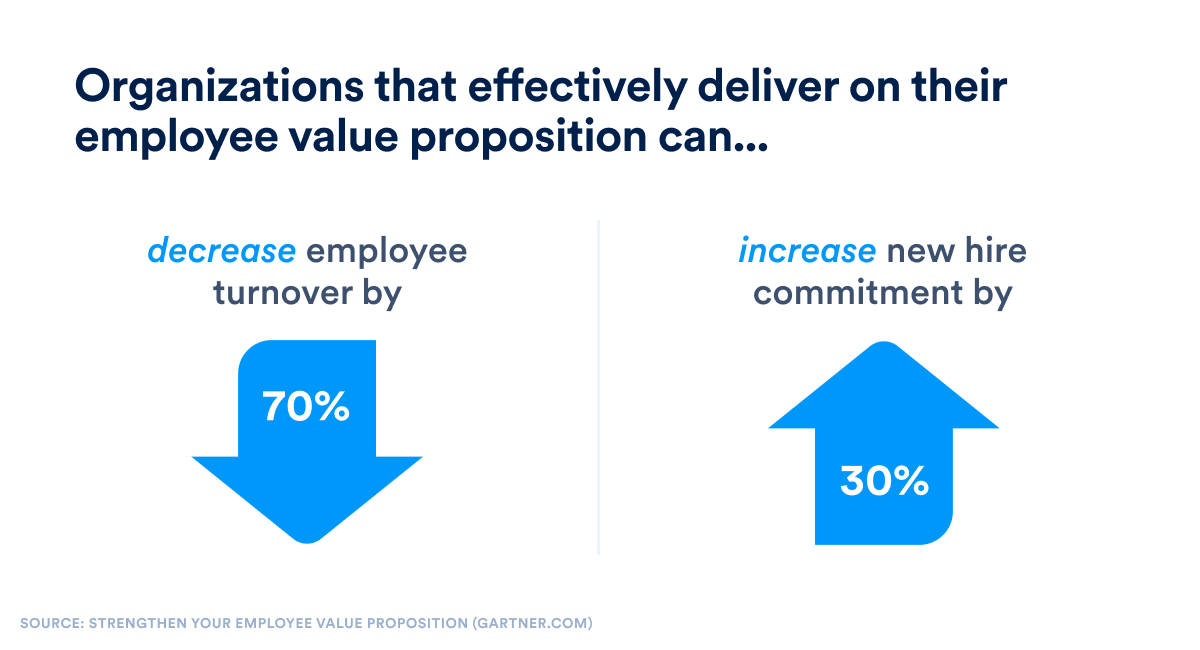
Improve Your Employee Value Proposition
As the war for talent rages on and candidate shortages escalate, the balance of power has tipped firmly in favor of job seekers. Now, they can pick and choose among prospective employers, and their expectations have never been higher.
If you’re hoping to entice great people to apply for roles in your organization, you’ll need to pay special attention to how you craft and articulate your company’s employee value proposition (EVP).
In this article, we’ll explore some ways to build and sustain a winning employee value proposition that will make your business the place where everyone wants to work.
What Exactly Is an Employee Value Proposition?
An employee value proposition is a set of financial and non-financial benefits that a business offers its employees in return for and in recognition of the time, skills, and experience they contribute by performing their jobs.
More modern thinking around employee value propositions moves the concept beyond a simple transaction between the two parties. Today, employee value propositions are recognized as being a comprehensive set of employer offerings designed to engage and support people and bring out the best in them. Those businesses that have mastered the art of building a compelling and authentic employee value proposition see the results in terms of a strong employer brand.
A modern definition of an employee value proposition would be: “A mutually beneficial and rewarding ecosystem of support, recognition, and values that an employer provides to its people to allow them to achieve their greatest potential at work.”
What Is the Importance of an Employee Value Proposition?
According to Gartner, businesses that invest in developing and delivering a strong employee value proposition can attract significant talent and boost employee engagement. For example…

Let’s take a closer look at some of the key reasons you should pay attention to the quality of your employee value proposition:
1. Recruit Top Talent
As we mentioned earlier, the job market has become more competitive than ever. In a post-pandemic world, people have hit “reset” on many levels and are fundamentally re-evaluating every aspect of their lives, including their careers.
Today, those who choose to return to or remain in the job market have set the bar high in their expectations of prospective employees.
Businesses that create a compelling and authentic employee value proposition and communicate it consistently and efficiently will be the ones that succeed in building a strong employer brand and will emerge as the winners in the battle for talent.
2. Retain Top Talent
Once you’ve finally ended your long search for that perfect candidate to fill that critical role, you need to work hard to make sure you retain them.
People have a range of choices about where they can work, so if they feel you’re not giving them the experience, opportunities, and support they need, they may come to regret their decision and move on. For this reason, optimizing your onboarding process should definitely be part of an employee value proposition.
Skilled and productive people are hard to replace, and, as we’ll explore in the next point, losing them is also expensive.
3. Minimize Recruiting Expenses
During their job search, candidates are drawn to businesses with a solid employee value proposition. That means that your HR team will need to spend less time and money working with recruitment and headhunting firms.
The cost of job advertisements, agency commissions, and brand marketing can quickly add up. Happy employees also translate into lower levels of employee turnover, which means vacancies need to be filled less often.
And finally, every time you lose an employee, you also lose all the investments you’ve made (both time and monetary) in their training and development.
What Constitutes an Employee Value Proposition?
1. Financial Benefits
Financial benefits encompass offerings such as salary or wages, bonuses, overtime, tips, and stock options, where relevant.
In a competitive job market, it’s important to offer market-related wages to the extent you can.
Employers should be mindful that now, more than ever, people aren’t motivated by financial compensation alone.
2. Employment Advantages
Other employee advantages or benefits include things such as health insurance, retirement contributions, paid leave, and health club memberships.
Ultimately, employers should focus on providing benefits that’ll be valued by employees and align with their personal circumstances or challenges. A good example is flexible payment models, which can be especially valuable for those working paycheck to paycheck.
For example, you could start allowing hourly workers to see and access the wages and tips they’ve earned in real time – a concept known as earned wage access (EWA.)
Payactiv offers a compelling model for EWA to help both employers and employees. The service is low-cost to employees and zero-cost to employers. Our unique operating model means that our service doesn’t involve lending money to employees – we simply provide them with access to their cash as they earn it.
Another great idea is to introduce a financial wellness program to help people take better control of their finances and household budgeting.
Also, why not sit down and have conversations with your employees about what rewards they’d prefer and give them more flexibility and options in the makeup of those packages?
3. Professional Advancement
People don’t just work to pay their bills and feed their families. Most have ambitions and a desire to better themselves.
This means that it’s vital to give employees opportunities to build their career paths. When given a chance to improve themselves, learn new skills, and be promoted, employees will recognize that their employer is equally committed to their career.
Think about giving employees opportunities to move into a different part of the business to apply their skills to new situations and challenges.
Why not also give people a chance to train or study flexibly and learn at their own pace?
4. Workplace Environment
This aspect of the employee value proposition creates and sustains a positive, healthy, and safe working environment and ambiance.
It includes things like a healthy work-life balance, flexible working arrangements, a cooperative – rather than toxic – office environment, collaborative and supportive teamwork, workspace design, and leadership that acts with integrity and leads by example.
Employee recognition and reward programs also fall into this category.
5. Corporate Culture
Corporate or organizational culture encapsulates the attitudes and behaviors of a business – both its leaders and its people. This culture manifests in the way employees and leaders interact with one another and the principles and values they are grounded in and base their decisions on.
The key elements of a company’s culture include its purpose, vision, mission, and values.
The importance of building a strong company culture has become increasingly recognized over recent decades by HR professionals. Specifically, it’s regarded as one of the most effective means to allow an organization to attract and retain the best skills. Interestingly, there’s also evidence to show a definitive link between a strong corporate culture and a business’s financial success.
5 Steps to Developing an Excellent Employee Value Proposition
1. Evaluate What you Already Provide
The fundamental first step is to establish a baseline of your “as-is” situation. Review the list of employee value proposition components above and make a note of which ones your business currently does and doesn’t have in place.
2. Conduct Exit Interviews with Current and Former Workers
Tapping into the thoughts and experiences of current employees and soon-to-be ex-employees (through exit interviews) is a good way to learn about what you’re doing right and the areas that need improvement. For current employees, consider using surveys and focus groups to gather your feedback.
3. Identify the Essential Components of your Employee Value Proposition
Now, it’s time to define the core, most relevant aspects of your desired employee value proposition based on your findings in the first two steps. Be sure to include relevant elements that appeal to people working in different roles and at different levels.
4. Create a Value Proposition for your Employees
Once you have a clear picture of how your organization stands out from your competition and understand precisely what value proposition you want to offer your employees and prospects, it’s time to write it down. Use clear, unambiguous language and consider summarizing it into a few bold but succinct statements.
5. Distribute your Employee Value Proposition through the Appropriate Channels
Finally, make sure that your new employee value proposition doesn’t just languish somewhere in a file or desk drawer. Make it a living and breathing document by communicating it organization-wide through the most appropriate channels. Also, be sure to articulate it on your career page and in job postings.
Final Thoughts
If you succeed in designing an employee value proposition unique to your business, you’ll be on track to boost your talent acquisition and retention levels. Moreover, you’ll be on your way to building an employer brand that gives you an edge over your competition.
Payactiv is helping employers build a productive and engaged workforce, which is an essential ingredient to sustaining a strong employee value proposition.
We offer access to cost-effective and risk-free financial services, which provide employees with a sense of financial wellness, help them remain focused on their jobs, and feel a greater sense of loyalty to their employers.
Essentially, we help organizations demonstrate to their people that they care about the real issues they face. Now, why would anybody not want to work for a company like that?
Learn more about how Payactiv can help your business build a great employee value proposition with our suite of EWA and other employee wellness tools and benefits, or book your demo now.
Get Payactiv for your business
Related Articles
Key takeaways: Automated cashless tips provide a secure and efficient way to...
The heart of every business is its employees, and these employees need to be...
February is Black History Month, a time to honor the rich history, vibrant...
© 2025 Payactiv, Inc. All Rights Reserved
24 hour support: 1 (877) 937-6966 | [email protected]
* The Payactiv Visa Prepaid Card and the Payactiv Visa Payroll Card are issued by Central Bank of Kansas City, Member FDIC, pursuant to a license from Visa U.S.A. Inc. Certain fees, terms, and conditions are associated with the approval, maintenance, and use of the Card. You should consult your Cardholder Agreement and the Fee Schedule at payactiv.com/card411. If you have questions regarding the Card or such fees, terms, and conditions, you can contact us toll-free at 1-877-747-5862, 24 hours a day, 7 days a week.
** Central Bank of Kansas City does not administer, nor is liable for earned wage access.
Payactiv holds earned wage access services (EWA) license number 2591928EWA with the Wisconsin Department of Financial Institutions.
Apple and the Apple logo are trademarks of Apple Inc., registered in the U.S. and other countries. App Store is a service mark of Apple Inc., registered in the U.S. and other countries.
Google Play and the Google Play logo are trademarks of Google LLC.
Galaxy Store and the Galaxy Store logo are registered trademarks of Samsung Electronics Co., Ltd.




